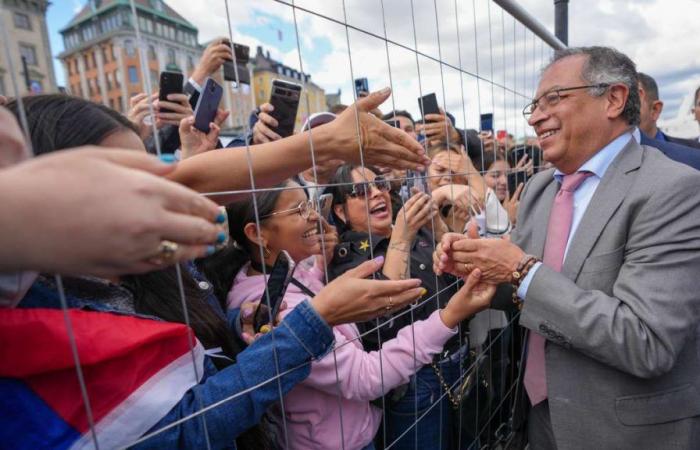
President Gustavo Petro spoke to the Colombian community in Stockholm, Sweden, on June 13, 2024.
Photo: Juan Diego Cano
The promise of change with which Gustavo Petro established himself as the first left-wing president in Colombia is not moving at the pace that the head of state would like, and even for his critics the progress is null, which is why the decision made by the House of Nariño is to adjust its structure at all levels, including foreign service. All of this will imply – which until now was only a suspicion – surrounding himself with people closer to his progressive ideology and who are committed to executing the Government plan, which for some voices is an eventual radicalization.
The new guidelines with which the Executive will carry out its task during the 782 days of its remaining mandate starting this Sunday have been in the works for several weeks, through meetings, analysis of goal achievement and consultations at the highest level. In fact, they are so ready to be implemented that Petro took advantage of his time in Sweden to touch on two of the most sensitive points of the adjustments.
More information: Petro will give the Government a boost to face the second half of its mandate
On the one hand, he made it clear that before July 20 there will be a profound ministerial shake-up and that in his cabinet there will be no room for political agreements like those that marked the first part of his mandate, when the expression national agreement was a constant in the story. official This means that partisan plurality would be definitively buried and that the second part of the Petro administration could be much more confrontational.
“It will not have political representation, the time that was for that is ending,” said the president in an extended dialogue with the media that covered his official visit to Sweden, including El Espectador. And he added: “If we go towards a national agreement, circumstances change; If we go to a grope, it doesn’t matter.”
See here: “It is an alignment on the side of war”: Petro canceled his trip to the summit in Switzerland
Unofficially, there is talk of the not-so-remarkable management of portfolios such as those of the Interior, headed by Luis Fernando Velasco, who faced tough opposition in Congress and who openly refuted the thesis of an alleged “institutional blockade” that Petro aired so much. Also of the failed agreements regarding the statutory education law, which brought the minister of the field, Aurora Vergara, to the fore. And what was done by the head of the Housing portfolio, Catalina Velasco, has even been touched on, whom the president has publicly pulled on the ears.
And, on the contrary, the head of state has defended controversial efforts such as those of the Ministers of Health, Guillermo Alfonso Jaramillo; of Defense, Iván Velásquez; and from the Treasury, Ricardo Bonilla. In any case, the fundamental changes are already coming and, depending on who assumes positions in the cabinet, it will be known how shocking the relationship with Congress will continue to be or not, which will also change its leadership and in whose main seats people would arrive. contrary to Petrism; In the Senate it is almost a fact of the election of the conservative Efraín Cepeda as president, and in the Chamber the possible arrival of the representative of the Green Alliance Katherine Miranda.
It is of your interest: Petro outlined an international agenda in Sweden with repercussions in Colombia
Sources from the Casa de Nariño confirmed that for the president’s inner circle, internal polls are key, as they show that there is still popular support and that the mass baths with marches to show that the self-proclaimed “government of change” has popular support are a avenue not yet exhausted, especially to pressure decisions in the Legislative and Judicial powers. In fact, it is in this way that the narrative of constituent power is being promoted to demonstrate that progressivism has a way to fight in 2026 for its permanence in power, something that has even been done on international stages.
And there comes into play the other scenario on which adjustments were made. In fact, President Petro took advantage of his visit to Stockholm – a stop prior to the peace summit on Ukraine that took place Saturday and Sunday in the Swiss town of Bürgenstock (although he canceled his attendance at the last minute because he considered it an “alienation next to the war”) –, to draw up a new strategy with the 26 ambassadors that Colombia has in Europe.
In context: “It is the constituent power: that the people decide about their own history”: Petro
Although the keys are coffee diplomacy, peace and neutrality in foreign wars, and a green agenda with issues around the energy transition and others, there was a clear message that marks his intention to shake up diplomatic work. “I have asked the embassies and consulates to open their doors, to no longer be for aristocrats or people on vacation, but rather to be work offices that help the entire Colombian community, regardless of whether they are legal or not in the eyes of the government. foreigner, because in the eyes of an embassy or a consulate of the Colombian State all Colombians abroad are equal; They deserve the necessary help in difficult situations, whatever they may be,” said the head of state.
Furthermore, also from Stockholm – a Scandinavian country with which several agreements were sealed to maintain cooperation on key issues such as peace and where the binational private sector had a broad point on the agenda – the president reiterated that there is a path that he does not think abandon in these two years of Government despite the shocks that it may bring at the institutional level.
President Gustavo Petro and the First Lady, Verónica Alcocer, met at the Royal Palace in Stockholm with Kings Carl XVI Gustaf and Silvia of Sweden, on June 13. EFE /Presidency
Photo: PRESIDENCY OF COLOMBIA/EFE – PRESIDENCY OF COLOMBIA
“Everything will depend on the decisions of the people,” the president said regarding what his administration is looking for in the two years and one long month that remain until the end of his term. And he added: “It is what I call constituent power: that the people decide about their own history.”
Another no small matter is connected here. It is already a fact that on July 11 he will intervene before the United Nations Security Council to denounce that the Colombian State that he represents failed to comply with the implementation of the Peace Agreement with the extinct FARC, which from a political point of view, According to sources from the House of Nariño, it could bring “traumatic” effects, because what lies behind it exceeds the Havana pact itself.
(This is how the business sectors that are with Petro in Sweden move)
For this reason, in dialogue with El Espectador, Petro warned that “declared non-compliance with the Agreement would undoubtedly have consequences.” An international nod to enhance the constituent narrative? The answer will depend on what you bring from that date in New York.
It is in this whole scenario that the head of state moves in the face of the two long years that remain in his mandate and in which he wants to dedicate himself to executing works with which progressivism can show results with which to show his chest to face the presidential elections. of 2026 and thus try to keep the left in power. And in the midst of these adjustments, Petro will continue seeking to position Colombia as an example of negotiated solutions to conflicts, which he did during the last week in Sweden.





